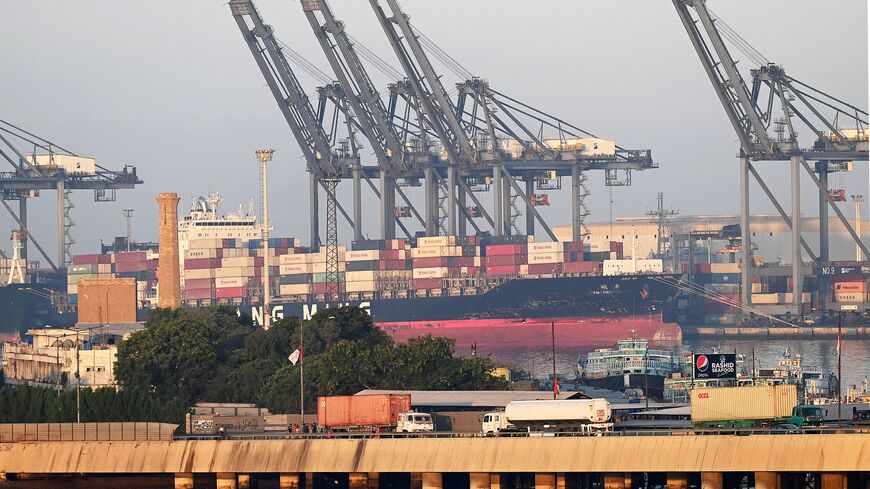KARACHI, Pakistan — A significant investment deal was finalized last week between the UAE-nominated AD Ports Group, a leading Emirati port operator and Pakistan's Karachi Port Trust (KPT), strengthening maritime industry ties between Abu Dhabi and Islamabad.
According to the 50-year concession agreement, the group will operate one of the port’s terminals — namely the Karachi Gateway Terminal Limited (KGTL) — and substantially invest in its infrastructure and superstructure with the bulk of it planned for 2026.
Extending Abu Dhabi’s influence, the AD Ports Group owns and operates 10 ports in the United Arab Emirates (UAE), while it has expanded a global network from Africa to Central Asia.
Capt. Mohamed Juma Al Shamisi, managing director and CEO of the AD Ports Group, said that the port terminal agreement exemplified his group’s strategy to invest in “key maritime trade routes for the UAE, replicating our successful integrated business model in regions that offer long-term, sustainable growth prospects.”
After the deepening of berths 6-9 at the East Wharf of KPT and the extension of quay walls and the expansion of container storage areas, the terminal would be able to handle Post-Panamax class vessels of a much larger capacity.
The collaboration will give Pakistan a thriving container terminal that can attract investment and help revive the economy, while Karachi Port can become a key player in the region’s maritime industry in the long run.
Pakistan’s financial crisis
Notably though, this deal has been clinched while Pakistan awaits financial assistance from the International Monetary Fund (IMF) to stabilize its struggling economy after more than a year of political instability and damage from catastrophic floods that left losses of $30 billion.
Even as the June 30 deadline nears for the latest review of a $6.7 billion loan program by the IMF, with no definite breakthrough, Islamabad seems to be resorting to some type of Plan B.
Last week, the Pakistani government unveiled an “economic revival plan” at a high-level meeting. This Plan B is to invite friendly countries to invest and fast-track projects in key sectors such as defense, agriculture, mining and energy with the help of a Special Investment Facilitation Council.
Zubair Faisal Abbasi, development policy and management specialist in Islamabad, explained the government's strategy. “Pakistan is currently a dollar-anemic economy needing money to retire debts. However, it is a developing nation too and needs investment to expand its infrastructure to shoulder ever-increasing economic activity," he told Al-Monitor.
"So looking at the twin needs, the government has decided to hand over four of the KPT berths to firms from the UAE that will pay royalty and invest over the next 10 years,” he added.
Having put together a negotiation committee for the deal, it will be Pakistan’s first intergovernmental transaction under a law enacted last year to raise emergency funds.
However, since it had no foreign exchange exposure to the Pakistani rupee, this terminal’s operations were completely dollarized and it was a valuable asset generating revenue of nearly $55 million along with other earnings of around $30 million annually.
Zeeshan Shah, financial analyst at FINRA in Washington, argued that the Emirati investment may not be a game changer. “The investment by the UAE in acquiring a number of berths at Karachi Port while welcome is not necessarily a game changer. The overall investment is not very large — below $250 million — and at most gives the UAE a foothold if the government ever decides to sell a controlling stake for the entire port and/or including Port Qasim [Karachi Port] to a foreign investor,” Shah told Al-Monitor.
With the UAE government naming AD Ports Group as its nominated entity and Pakistan declaring KPT as a counterpart nominated entity, the terms of the transaction were finalized and the federal cabinet was requested to approve the draft framework agreement as soon as possible.
Nadeem Haque, former deputy chairman of the Planning Commission of Pakistan, told Al-Monitor that he had no idea of the details. “The devil is in the details. The idea itself is not bad, but we have to trust in our ability to negotiate. It needs to be more transparent and less hasty," he said.
Paying $50 million to KPT upfront, AD Ports will invest around $102 million for its expansion in the next three to five years. Spending nearly $220 million in the first decade, AD Ports will be the majority shareholder in a joint venture with the UAE-based company Kaheel Terminals to manage, operate and develop the KGTL berths 6-9 at Karachi Port’s East Wharf.
“The UAE would probably be doing this as a test run to see if they can make larger investments in the future," Shah noted. "This would be dependent on whether Pakistan can enact the type of long-term economic and structural reforms that would encourage export-oriented industries and promote foreign direct investment that the Saudis, Emiratis and Chinese have been asking Pakistan for years to undertake, but which so far have not been done and which has prevented any major foreign direct investments from occurring."
Being the first transaction of its kind, there might be challenges if the outgoing operator disagrees. For about 21 years, this Karachi port terminal was under the administrative control of the Pakistan International Containers Terminal (PICT), a subsidiary of ICTSI Mauritius with its parent company being the International Container Terminal Services Incorporated in the Philippines.
Subject to certain conditions, PICT had the first right of refusal under the concession agreement and it is unclear whether legal challenges remain. Initially, the plan was that KPT would run these terminals, but it did not have the capacity and operations given to PICT until June 30.
Summing it up, Abbasi observed that much of the investment would be front-loaded until 2026. "It is not an ideal solution per se, but it has the potential to solve urgent and important problems of the country along with modernizing the port and allied facilities for handling international trade,” he said.
Pakistani-UAE relations
Meanwhile, in another groundbreaking development on Sunday, Abu Dhabi has committed a substantial investment package in Pakistan’s sustainable energy sector.
The private office of Sheikh Ahmed Dalmook Al Maktoum has signed two important memorandums of understanding to undertake strategic projects. The first one being a floating solar power project of up to 1,000 megawatts for existing water reservoirs, while the other is for upgrading four existing hydropower projects. There have also been investments in the Oracle Green Hydrogen project.
Therefore, UAE-Pakistani ties can be said to be on an upward trajectory, especially at a time when Islamabad needs strong regional support in case the IMF backs out.
In 2021, the UAE was Pakistan’s biggest regional trading partner, accounting for at least 40% of Pakistan’s trade with the Arab states, and nonoil exports from the UAE of around $1.3 billion in 2022. Last year, reexports from the UAE to Pakistan amounted to $2.9 billion, projecting a growth of 7.7% compared to 2021.
Early this year, Abu Dhabi helped Islamabad out by deferring a $2 billion loan and agreeing to an additional loan of $1 billion, but IMF loan conditions still prevent Pakistan from accessing various amounts from other sources until their program is restored.
Lately, there have been negotiations to sign a Comprehensive Economic Partnership Agreement with the UAE, under which active policy measures would be taken to remove trade barriers, rationalize tariffs and facilitate investors on both sides.








